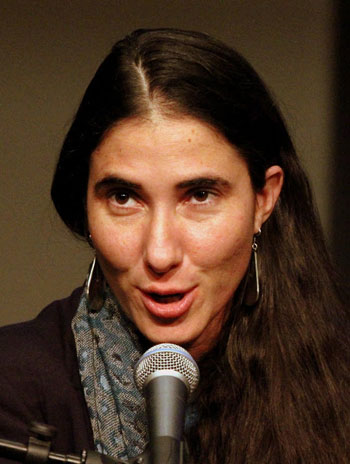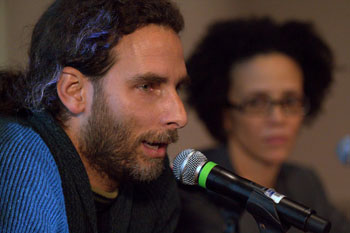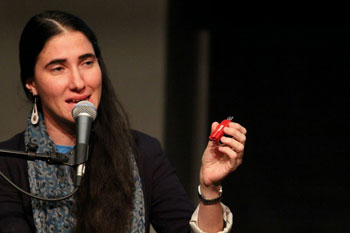By Tracey Eaton
Florida Center for Investigative Reporting
NEW YORK–Dangerous, daring and illegal — that’s how Yoani Sanchez describes her quest to launch an independent digital newspaper in Cuba later this year.
RelatedSlideshow: Cuban Blogger Yoani Sanchez in the United States PartnersEn EspañolBloguera disidente cubana Yoani Sánchez recorre Estados Unidos |

Yoani Sánchez said “having a blog in Cuba is the easiest way to get into trouble.” No matter, she has no plans to stop now, saying, “There’s no return to silence.” (Photo by Tracey Eaton.)
“I don’t want to wait until the conditions are perfect,” she told the Florida Center for Investigative Reporting. “Now is the time to start.”
Sanchez, 37, an award-winning Cuban blogger, is in the midst of an 80-day tour through Europe and the Americas. She plans to visit with lawmakers in Washington, D.C., and speak before the Inter-American Commission on Human Rights later this week.
She said starting a digital newspaper in Cuba is her “life’s dream.” But reaching her countrymen won’t be easy. Cuba has the lowest Internet connection rate in the Western hemisphere and the government controls the press.
Undeterred, the barnstorming blogger plans to use underground tactics, passing along news and information on flash drives and DVDs.
“Technology isn’t going to bring down a dictatorship,” she said, but it will play a key role. “Technology is changing people’s lives.”
Sanchez says Twitter and its bluebird mascot have boosted her fight for democracy, helping to shield activists from repression. She recalled that when agents detained her and two others in Havana in 2009, fellow blogger Claudia Cadelo managed to send a pre-written tweet: “We’re arrested.”
The activists’ supporters denounced their arrest and they were freed.
“The flight of the bluebird even rescued us,” Sanchez said.
She said her 450,000-plus Twitter followers came to the rescue again three years later, rallying support for victims of Hurricane Sandy in eastern Cuba.
Word that she was collecting donations in October 2012 spread “like the flu,” and in just three days, a ton and a half of food, medicine and other supplies piled up in the living room of her high-rise Havana apartment.
Twitter isn’t just a figment of the virtual world, she said. “It can work in reality.”
Cuban writer and artist Coco Fusco said Sanchez “has turned the limitation of the 140-character text message into an asset.”
And that has brought her adoration from many exiles, Fusco said.
“Yoani says in public what every Cuban who left wanted to say out loud, but couldn’t.”
‘Generación Y’
Sanchez launched her blog, Generación Y, in 2007. Time magazine named her as one of the world’s most influential people in 2008. Columbia University awarded her the prestigious Maria Moors Cabot journalism prize in 2009. By then, her blog was getting 14 million hits per month. More prizes followed.

Cuban writer, blogger and photographer Orlando Luis Pardo joined Yoani Sánchez in New York. He told reporters that Cuba is a “medieval country” when it comes to press freedom. “There is no freedom of expression in Cuba,” he said. (Photo by Tracey Eaton.)
Some Cuban government supporters claim that U.S. officials secretly planned and financed the blogger’s meteoric rise.
“Yoani Sanchez has won more prizes than Gabriel Garcia Marquez and more than Mario Vargas Llosa. Is she a better writer than them? No,” said a Cuban official who requested anonymity because he didn’t have authorization to speak to the press. “She doesn’t have 500 people in Cuba who follow her. All her followers are outside Cuba. She is a creation of the blogosphere.”
The official added:
“If Venezuela gave $200,000 to the Occupy Wall Street movement, what would the United States do? Declare war.”
Sanchez scoffs at the idea she was somehow cooked up in a lab at the Pentagon or is a product of the CIA. But that didn’t stop scattered protesters from making such accusations when spoke at Columbia University, New York University and the New School last week.
Demonstrators flung copies of $1 bills emblazoned with the blogger’s face during her appearance on March 16 at the New School.
“Liar!” they shouted. “Go home!”
The blogger’s supporters screamed at the protesters and tore up their signs.
“People just insulted me and ripped up my sign,” complained one protester, wearing a red dress. “I had a totally peaceful statement that I was making about the difference between health care in the United States and Cuba and I was attacked.”
“You defend slavery!” a Sanchez supporter yelled at the woman.
“We all had to leave Cuba,” another supporter said. “Go to Cuba. Then we’ll talk.”
As security personnel escorted protesters away, Sanchez quipped:
“One of Cuba’s most exportable items: the act of repudiation.”
That drew laughter and applause from the audience, which included Cuban exiles who were victims of such acts in Cuba, where socialist government supporters sometimes hurl rocks, eggs and buckets of oil at dissidents’ homes.
After watching YouTube videos of the confrontations, Arturo Lopez-Levy, a Cuba expert at the University of Denver, said the blogger’s events mark “another missed opportunity for a real dialogue.”
Organizers should have allowed for more debate, he said.
“A dialogue to them means the person they like, in this case Yoani, is on the podium and the rest go there to ask questions,” Lopez-Levy said. “She has all the time of the world and those who disagree with her have two minutes to ask a question … It is shameful that the universities didn’t create space for the well-needed debate.”
Organizers at the blogger’s events said they had no intention of trying to settle the debate over Cuba.
At Columbia, the focus was on journalism. Columbia journalism professor Josh Friedman said: “Yoani seems to me to be devoid of ideology. She’s an observer.”
And if she is a U.S. government invention, she doesn’t follow Uncle Sam’s script.
She opposes the longtime ban on U.S. trade with Cuba, yet she’s willing to listen to all sides.
The blogger’s 12-country trip began on Feb. 17 in Brazil. From there, she traveled to the Czech Republic, Spain, Mexico and the United States.
“Irreversible change” is transforming Cuba, she told a crowd at New York University on March 15.
Independent bloggers and democracy activists are forcing Raul Castro’s government to evolve, she said.
“Cuba is changing, but not because of Raul’s reforms. Forget that.”
A Cuban government official disputed her view.
“If a television tower fell down tomorrow, she’s going to say it was because of her,” said the official, who was expressing his personal opinion, not necessarily the government view.
The official said change in Cuba is happening as a result of reforms spelled out in a November 2010 document called the Draft Guide for Economic and Social Policy. The document incorporates some 400,000 suggestions collected from Cubans around the country.
Conner Gorry, an American journalist and blogger who is based in Havana, said diverse opinions and an “unprecedented level of debate” in Cuba “is shaping changes on the island.”
“Unfortunately,” she said, “the average American is unaware of this debate and therefore unable to draw their own conclusions because they’re prohibited from traveling freely to Cuba under U.S. law. There is no substitute for first hand experience and knowledge.”
‘The Day After’
Orlando Luis Pardo, a Cuban writer, photographer and blogger who joined Sanchez in New York, contends no meaningful debate is going on.

Someday, Yoani Sánchez predicted, someone will build a monument in Cuba in honor of the thumb drive. Cubans use such tools to pass along news and information, getting around state-controlled media in the Internet-deprived nation. (Photo by Tracey Eaton.)
The Cuban government sees its own citizens as “enemies.”
“There is no freedom of expression in Cuba. It is a medieval country in that respect.”
Sanchez warned that change in Cuba will likely be slow.
Apathy in Cuba is a “national epidemic,” she said. Many Cubans believe it’s futile to challenge the government and would rather leave than fight.
“Cuban rebels are standing in line at foreign embassies to get visas to get out of the country or they’re throwing themselves into the sea on boats made from the doors of a house.”
Access to information is another problem, she said.
Cubans must pay as much as $6 to $12 per hour to access the Internet, which she regards as “an act of censorship in itself.”
Even tweeting is expensive — $1.10 per tweet, meaning that Sanchez’s nearly 16,000 tweets have cost more than $17,000.
Sanchez said she does not receive money directly from any foreign government. She figures she has earned enough prize money to finance her digital newspaper for three years.
After the Castro brothers are no longer in power — a time she and followers refer to as “the day after” — she envisions publishing a print edition of her newspaper.
Cuban government supporters say they don’t understand how she finances her online activities. At Columbia, one woman yelled, “How’s that CIA money?”
Members of the blogger’s inner circle say such talk doesn’t faze her.
“So what happens when she leaves the public stage after being beaten up or even adored to death? Does she snarl behind the scenes? No! She just gets even more lively and energetic and funny and happy,” one supporter said.
